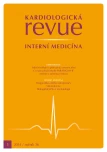Conclusions of the PARADIGM‑ HF study
Authors:
L. Špinarová 1; J. Špinar 2,3; J. Vítovec 1
Authors‘ workplace:
I. interní kardioangiologická klinika LF MU a FN u sv. Anny v Brně
1; Interní kardiologická klinika LF MU Brno
2; Mezinárodní centrum klinického výzkumu, Brno
3
Published in:
Kardiol Rev Int Med 2014, 16(5): 395-397
Category:
Cardiology Review
Overview
Background:
PARADIGM ‑ HF compared the angiotensin receptor ‑ neprilysin inhibitor LCZ696 with enalapril in patients who had heart failure with a reduced ejection fraction.
Methods:
In this double‑blind trial, 8442 patients with class II, III, or IV heart failure and an ejection fraction of 40% or less were assigned to receive either LCZ696 (at a dose of 200 mg twice daily) or enalapril (at a dose of 10 mg twice daily), in addition to the standard therapy. There were two primary outcomes – mortality from cardiovascular causes and hospitalisation for heart failure, but the trial was designed to detect the differences in the rates of mortality from cardiovascular causes.
Results:
In line with the pre‑specified rules, the trial was stopped early, after a median follow‑up of 27 months, because the boundary indicating a clear benefit achieved with LCZ696 had been exceeded. At the time of study closure, the primary outcome had occurred in 914 patients (21.8%) in the LCZ696 group and 1117 patients (26.5%) in the enalapril group (hazard ratio in the LCZ696 group, 0.80; 95% confidence interval [CI], 0.73 to 0.87; P < 0.001). A total of 711 patients (17.0%) receiving LCZ696 and 835 patients (19.8%) receiving enalapril died (hazard ratio for death from any cause, 0.84; 95% CI, 0.76 to 0.93; P < 0.001); of these patients, 558 (13.3%) and 693 (16.5%), respectively, died from cardiovascular causes (hazard ratio, 0.80; 95% CI, 0.71 to 0.89; P < 0.001). As compared with enalapril, LCZ696 also reduced the risk of hospitalisation for heart failure by 21% (P < 0.001) and decreased the symptoms and physical limitations of heart failure (P = 0.001). The LCZ696 group showed higher proportions of patients with hypotension and non‑serious angioedema but lower proportions of patients with renal impairment, hyperkalemia, and cough when compared to the enalapril group.
Conclusions:
LCZ696 was more effective than enalapril in reducing the risk of death and of hospitalisation for heart failure.
Keywords:
LCZ696 – enalapril – heart failure
Sources
1. The SOLVD Investigators. Effect of enalapril on survival in patients with reduced left vent ricular ejection fractions and congestive heart failure. N Engl J Med 1991; 325 : 293 – 302.
2. Packer M, Coats AJ, Fowler MB et al. Effect of carvedilol on survival in severe chronic heart failure. N Engl J Med 2001; 344 : 1651 – 1658.
3. Pitt B, Zannad F, Remme WJ et al. The effect of spironolactone on morbidity and mortality in patients with severe heart failure. N Engl J Med 1999; 341 : 709 – 717.
4. Packer M, Califf RM, Kostam MA et al. Comparison of omapatrilat and enalapril in patients with chronic heart failure: the Omapatrilat versus Enalapril Randomized Trial of Utility in Reducing Events (OVERTURE). Circulation 2002; 106 : 920 – 926.
5. McMurray JJ, Packer M, Desai AS et al. Angiotensinneprilysin inhibition versus enalapril in heart failure. N Engl J Med 2014; 371 : 993 – 1004. doi: 10.1056/ NEJMoa1409077.
6. McMurray JJ, Adamopoulos S, Anker SD et al. ESC guidelines for the diagnosis and treat ment of acute and chronic heart failure 2012. The Task Force for the Diagnosis and Treat ment of Acute and Chronic Heart Failure 2012 of the European Society of Cardiology. Deve loped in collaboration with the Heart Failure Association (HFA) of the ESC. Eur Heart J 2012; 33 : 1787 – 1847. doi: 10.1093/ eurheartj/ ehs104.
Labels
Paediatric cardiology Internal medicine Cardiac surgery CardiologyArticle was published in
Cardiology Review

2014 Issue 5
-
All articles in this issue
- Kidneys and heart failure
- Treatment of anemia and iron deficiency from the hematologist’s perspective
- Treatment of anaemia and iron deficiency in chronic heart failure
- Treatment of sideropenic anemia in gastroenterology
- Treatment of iron deficiency anaemia from the nephrologist’s point of view
- Aerobic and specific inspiratory muscle training in patients with chronic heart failure
- The profile of patients with acute heart failure managed in pre‑hospital setting
- Rupture of a sinus of Valsalva aneurysm as an unusual cause of chest pain – case report
- Conclusions of the PARADIGM‑ HF study
- Osteoporosis diagnosis and treatment
- Antiphospholipid syndrome – diagnostics, manifestation and treatment
- Systemic sclerosis
- Biologics in the treatment of rheumatoid arthritis
- Adverse effects of biological therapy in rheumatology
- Heart failure and COPD – Review Article
- Heart failure and diabetes mellitus
- Cardiology Review
- Journal archive
- Current issue
- About the journal
Most read in this issue
- Treatment of anemia and iron deficiency from the hematologist’s perspective
- Antiphospholipid syndrome – diagnostics, manifestation and treatment
- Adverse effects of biological therapy in rheumatology
- Systemic sclerosis
